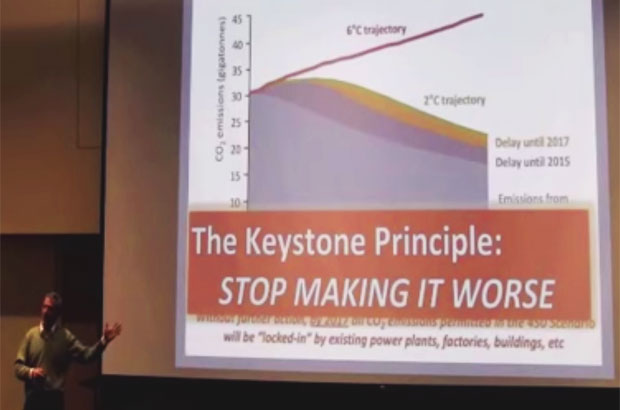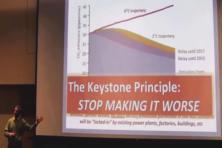In 2015, already set to be a year of major pushes for climate action from the local to the global levels, a growing community of the climate-concerned in Washington State are ready to put a price on out-of-control carbon emissions. A recent panel at the University of Washington, Putting a Price on Climate Pollution in Washington State, presented a range of views on this topic: broadly speaking, policies intended to reduce the greenhouse gas emissions that cause global warming by creating economic incentives for largest polluters to clean up their act.
Panelists included Climate Solutions' KC Golden, Nicole Keenan from Puget Sound Sage, Yoram Bauman of Carbon WA, and Todd Myers of the Washington Policy Center; the event drew a large crowd of students and citizens of all ages eager to discuss strategies for fighting climate change.
One observation emerged clearly from the discussion: Washingtonians are already paying a price for our use of fossil fuels--air pollution, ocean acidification, and sea-level rise. Communities living near pollution hot spots, the oyster industry, and coastal residents are disproportionately affected by the economic, health-related and social costs of carbon pollution impacts. Those costs could increase considerably in the future.
The panel showed how cap-and-trade systems like California's can improve equity by targeting pollution hot spots near disadvantaged communities, while a British Columbia-style carbon tax can influence individual behavior. A cap-and-trade system provides a legally binding cap on emissions levels to ensure reduction targets are met, while a tax offers ease and simplicity of implementation.
Carbon pricing has challenges, as the panelists pointed out. The European cap-and-trade system may have given out too many free allowances. Tough questions ahead include: How much should a ton of CO2 be taxed? How many allowances should be given in cap-and-trade system? These are important questions that will be answered more effectively over time as we learn lessons from carbon pricing around the world and implementing carbon pricing here at home.
In Seattle and beyond, people differ in opinions about whether cap-and-trade is better than a tax, what is the right number of carbon emission permits, how high the tax should be, and so on. Despite these differences in opinion, Washingtonians know the Price is Right when the price of carbon pollution is a carbon tax or a permit purchased through a cap-and-trade system, rather than climate impacts.
In British Columbia, carbon taxes are reducing emissions while a cap-and-trade system in California is not only reducing emissions but also using the revenue to invest in reducing emissions even more. They are succeeding in putting a new price on carbon, the right price.
A second panel discussion about Putting a Price on Carbon Pollution in Washington State will take place at Town Hall in Seattle on March 16th. Come and join the conversation!

